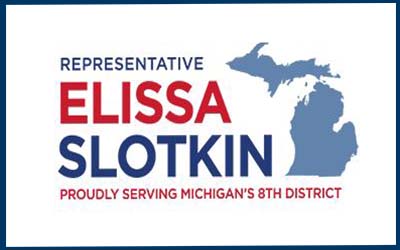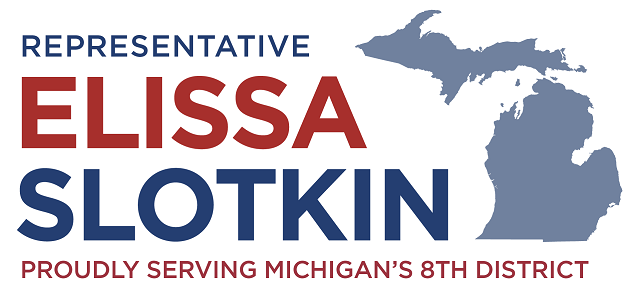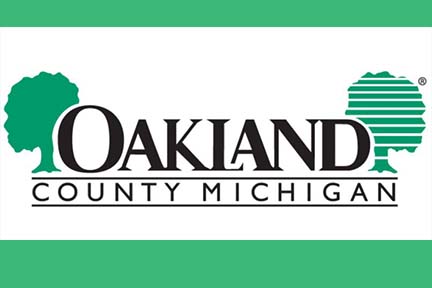
Equity in infrastructure: Taking the pledge
|
|
|

|
|
|

 |
|||
|
|
|||
| Hi there,
Almost one year ago, we passed the Bipartisan Infrastructure Law (BIL) – the biggest investment in America’s infrastructure since the construction of the interstate highway system when Dwight Eisenhower was President. Thanks to this law, Michigan will be getting $10 billion over the next decade to rebuild our roads and bridges, expand broadband access to every corner of the state, and to finally replace lead pipes and repair our water infrastructure. Earlier this year, the White House named former New Orleans Mayor Mitch Landrieu to serve as the coordinator for implementing the law, and on Friday I had the pleasure of welcoming him to mid-Michigan to see how we’re already getting shovels in the ground. We visited the I-69 bridge in Eaton County, an essential artery of our road system that carries traffic over the Grand River just outside Lansing. Using funds supplied by the Bipartisan Infrastructure Law, the bridge is currently undergoing a $1.8 million repair that will also make it more resilient to storm surges along the Grand River. But the best part is that much of the work is being done by our very own Operating Engineers 324. As we wrote the bill in Congress, we made sure to include Buy-American and prevailing wage provisions so that projects like this one support American businesses and give our workers a living wage that can support their families.
The I-69 bridge project is just one of the first of many examples of how the BIL is making a concrete impact in Michigan. Earlier in the week, I had the chance to see the great work being done on the other side of Lansing to rebuild I-496, a project funded in part by the BIL. These projects will in turn create tens of thousands of union jobs. Not to mention the fact that these investments in our infrastructure will help support families, local businesses, and our state’s tourism industry. As a member of the Problem Solvers Caucus, I was a part of the group that first laid out the initial framework for this bill in the summer of 2021, so it’s really gratifying to visit a work site like this and see shovels in the ground making a real, tangible difference for our state. Congress has been talking about getting a federal infrastructure package done for decades, and thanks to a group of Democrats and Republicans putting partisan politics aside and working together, we finally came to a compromise and got it done. – Rep. Elissa Slotkin |

Pontiac, Michigan – Oakland County Executive Dave Coulter has made two key appointments to his administration, naming Walt Herzig as the deputy county executive who will be the liaison with the Board of Commissioners, the county’s delegations in the state Legislature and Congress along with the state and federal government and Harry Weaver III as the new Oakland County Chief Diversity, Equity and Inclusion Officer.
Herzig brings an extensive record of public service to the job, including being the district director for U.S. Rep. Andy Levin, former U.S. Rep. Sander Levin and former U.S. Sen. Carl Levin. He also was the Chief of Staff for former Lt. Gov. John Cherry.
In 2010, Herzig led the state government’s effort to educate Michigan residents about the U.S. Census and ensure a high participation rate. As a result of those efforts, Michigan had the fifth-highest mail response rate in the nation.
“Walt’s impressive record includes seamlessly working with leaders at all levels of government,” said Coulter. “He has a deep understanding of this county and state as well as the inner workings of the state and federal government and is uniquely qualified to work with the diverse array of communities that make up Oakland County.”
Herzig said he’s looking forward to continuing to build on the relationships with local communities that he developed during his time working in the congressional districts that included Oakland County.
“The county’s landscape includes urban, suburban, exurban and rural communities,” Herzig said. “Bridging the gaps and connecting those regions with county, state and federal resources will be a top priority.”
Herzig received a bachelor’s degree from the University of Michigan-Dearborn. He lives in Ferndale with his wife and two children.
Weaver brings a wealth of experience to the job with more than two decades working in the DEI space, at the Chippewa Valley School District in Clinton Township, as the Education Director and Certified Trainer at the Anti-Defamation League, Michigan Region for 16 years and as an independent DEI consultant.
With support from the Board of Commissioners, Coulter made creating this position a top priority in 2019 to provide vision and leadership in the development of new programs that advance the county’s efforts toward inclusive excellence.
“It is critical to champion a workforce that is welcoming and inclusive and represents the broad diversity of Oakland County. And I know Harry will be an outstanding leader in this job,” Coulter said. “Too often the work of DEI can seem academic or theoretical, but at its core, DEI seeks to ensure that workplaces are inclusive and supportive of all workers and our services are not just available but accessible to all residents.”
Weaver has developed anti-bias programming and training for corporations, communities, school districts, businesses and law enforcement agencies, helping to create an outstanding model that will translate seamlessly to Oakland County. In the new position, he also will take over as leader of the county’s Equity Council.
Weaver said that DEI work is necessary not only in times of conflict but in the everyday work environment as well.
“We spend a lot of time at work, so people need to learn about and be around people who are different from them,” he said. “And you want the people of your community to see a reflection of themselves at the county, regardless of their background.”
As a person who uses a wheelchair, Weaver also brings a unique perspective to the job that will benefit both employees and visitors to the county campus.
Weaver received a bachelor’s degree from the University of Michigan and lives in Canton with his wife and two children.
Both Weaver and Herzig began their new roles this week.


FOR IMMEDIATE RELEASE October 17, 2022 Contact: press@michigan.gov
PHOTOS: Lt. Governor Gilchrist Tours Student Support Program, Highlights Administration’s Investments in Tutoring and Additional Supports for Students
BANGOR TOWNSHIP, Mich. – Today, Lt. Governor Garlin Gilchrist II visited Lincoln Elementary in Bangor Township where he toured the school’s tutoring program and learned about the work education professionals are doing to support student growth. Then, Lt. Governor Gilchrist participated in an education roundtable alongside the superintendent and principal, as well as an instructional support specialist, parent, teacher, and student to discuss the administration’s record investments in Michigan educators, students, and schools. Recently, Governor Whitmer put forward the MI Kids Back on Track plan to invest $280 million to tackle unfinished learning with tutoring or other forms of personalized instruction before, during, or after school.
Michigan has received $50 million to support programs like the MI Kids Back on Track plan and Governor Whitmer and Lt. Governor Gilchrist are calling on the legislature to fund the remaining $230 million to ensure kids are getting critical personalized support needed to get kids on track for success.
“As a parent with kids in public school, I know how important it is to partner with parents, attract and retain the best educators, and support our students with the resources they need to thrive in the classroom and beyond,” said Lt. Governor Garlin Gilchrist II. “Governor Whitmer and I are committed to positioning young people in Michigan for success, which is why we passed a historic education budget and proposed the MI Kids Back on Track plan, which would invest $280 million in continuation of personalized academic supports that help students thrive. We will keep working hard to help educators and students tackle unfinished learning and get students the best education possible.”
MI Kids Back on Track Governor Whitmer’s MI Kids Back on Track plan would invest $280 million of Michigan’s $6 billion in additional revenue to continue to tackle unfinished learning with tutoring or other forms of personalized instruction before, during, or after school. Michigan schools have already received state and federal resources from the American Rescue Plan specifically to address unfinished learning. MI Kids Back on Track would build on this funding with state resources to bolster tutoring programs and individualized instruction that meets kids’ needs.
Bangor Township Schools is in Bay City and serves 2,500 students from grades K-12. This year’s focus is “Excellence Everyday” in schools and programs. Across the district, it means connecting students with individualized academic help and doing whatever it takes to achieve success. At Lincoln Elementary, tutors work with students to help them meet academic goals and use an “I Teach/You Teach” approach to help students understand complex concepts.
“The continued investment in education by the Governor and Legislature is allowing ISD’s and local districts to put in place systems of support that will help in learning recovery as well as long term student achievement,” said Matt Schmidt, Bangor Township Schools Superintendent. “This year’s record investment in education will impact our schools for decades to come, and is a strong commitment to students and to our schools.”
“The work happening in Bangor Township Schools, and across Bay and Arenac counties, to support high quality literacy instruction has been focused, intentional, and is making a significant impact on our students,” said Michelle Goaley, Curriculum Director at Bay-Arenac ISD. “Our ISD and district partnership to implement the GELN Essential Instructional Practices in Literacy is vital to ensuring every student gets the very best instruction every day.”
FY 2023 Education Budget Investments The recently signed bipartisan education budget can be divided into six key sections: students, mental health, learning supports, student safety, school infrastructure, and teacher recruitment.
1) Students The budget invests the highest state per-pupil funding in Michigan history—$9,150 for every kid, in every public school district. Additional support for the nearly 200,000 special education students and 710,000 at-risk students in Michigan. Expanding funding for career and technical education programs by 27%.
2) Mental Health The budget includes dedicated mental health dollars for every student in every school. Increasing funding for teen centers, district mental health grants, and TRAILS, which offers training to school mental health professionals so they can better serve students with evidence-based services.
3) Teacher Recruitment The budget funds MI Future Educator Fellowships, which pay up to $10,000 in tuition for 2,500 future Michigan educators a year, $9,600 stipends a semester for student teachers, and Grow-Your-Own programs that help districts put support staff on no-cost paths to become educators.
4) School Infrastructure $250 million for school construction and renovations, helping them build or refurbish classrooms, labs, and libraries.
5) Learning Supports The budget expands before and after-school programs to keep kids engaged. It offers every kid in Michigan tutoring to help catch up and get on track for long-term success, and resources for districts to develop learning pods for academically at-risk and economically disadvantaged students.
6) Student Safety The budget includes dedicated school safety dollars for every student in every school. It includes funds to hire more on-campus school resources officers, create an intervention system for at-risk students that brings together law enforcement, schools, and mental health professionals, and establish a school safety commission.
Governor Whitmer’s Education Investments For four years in a row, Governor Whitmer has worked across the aisle to make the largest education investments in Michigan history—without raising taxes. Since taking office, the governor has tripled the number of literacy coaches, closed the funding gap between schools, boosted state per-student investment to an all-time high, and helped districts hire thousands of teachers and on-campus mental health professionals.
|


FOR IMMEDIATE RELEASE October 17, 2022 Contact: press@michigan.gov
Governor Whitmer Applauds Action to Put More Money in Seniors’ Pockets, Lower Costs on Health Care and Prescription Drugs
LANSING, Mich. – Today, Governor Whitmer reminded Michigan seniors about resources available to them to help save money. Since Governor Whitmer took office, she’s achieved her goal to become the first “age-friendly state” in the Midwest by proposing bold initiatives to lower costs for seniors including a roll back of the retirement tax, expanding access to healthcare, lowering the cost of prescription drugs including insulin, and more. Changes from the federal government are also building on Governor Whitmer’s work to put more money back in Michigan seniors’ pockets.
“We must do more to help older Michiganders retire with dignity — right now stressors are forcing them to make impossible choices between medication, food, rent, and other bills,” said Governor Whitmer. “I am committed to ensuring more seniors can access affordable healthcare, drive down the cost of prescription drugs, and cut taxes for seniors so they can retire with their hard-earned money. I will work with anyone to continue our work supporting Michigan seniors.”
Social Security Cost-Of-Living Adjustments Social Security and Supplemental Security Income (SSI) benefits for approximately 70 million Americans will increase 8.7 percent in 2023, the Social Security Administration announced. On average, Social Security benefits will increase by more than $140 per month starting in January.
Hearing Aids In August, the Food and Drug Administration (FDA) approved the sale of over-the-counter hearing aids, which becomes effective today. Residents can access more affordable options for hearing aids over the counter, saving Michiganders up to $3,000.
Retirement Tax Governor Whitmer has proposed an elimination of the retirement tax to save half a million households an average of $1,000 a year. Under the previous administration, the legislature and Gov. Rick Snyder imposed a retirement tax on Michigan residents.
Expanding access to healthcare and lowering the cost of prescription drugs Under Governor Whitmer’s leadership, nearly 900,000 people are covered by Healthy Michigan, and the governor expanded dental care for Michiganders covered by Medicaid or Healthy Michigan plans. The governor also expanded access to telemedicine and signed bipartisan legislation requiring all insurers to cover telehealth. Governor Whitmer also created and consistently supported funding for a dementia care unit with DHHS to reduce the burden of dementia in the state.
Governor Whitmer will work with anyone to get things done for Michigan, and that’s why she worked with the legislature and signed bipartisan legislation to protect Michiganders against surprise medical billing, to lower the cost of prescription drugs and increase pharmacy oversight based on recommendations from the Prescription Drug Task Force.
Insulin Governor Gretchen Whitmer signed an executive directive to determine how the State of Michigan can lower the cost of insulin, including by developing its own manufacturing capabilities. Michigan is home to over 912,000 Michiganders with diabetes, and far too many are forced to ration or forgo insulin.
The recently signed Inflation Reduction Act will lower the cost of energy, health care, and prescription drugs for Michiganders. Specifically, the law includes a $35 a month cap on insulin for Medicare recipients. According to the most recent data, 122,000 Michiganders on Medicare used insulin, and the Inflation Reduction Act caps their insulin costs at $35 a month.
Making Michigan an Age-Friendly State Under Governor Whitmer’s leadership, Michigan became the first “Age-Friendly State” in the Midwest to ensure Michigan prepares for dramatic and imminent demographic changes and that communities can take steps to accommodate all ages, including making Michigan the most affordable state to retire in 2022. The governor has consistently invested in programs supporting older Michiganders including increasing nursing home support payments; expanding services to age in place, senior home care, and access to senior centers; improving preventative services, transportation options, health screenings and services, and meal delivery; reducing hospital readmission; combatting elder abuse, and more.
|